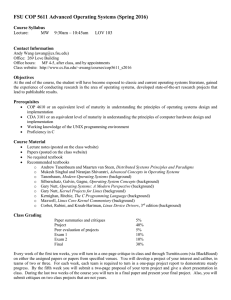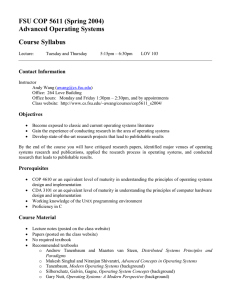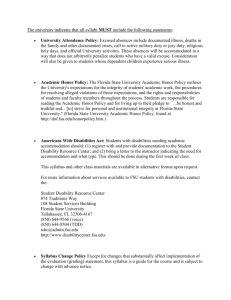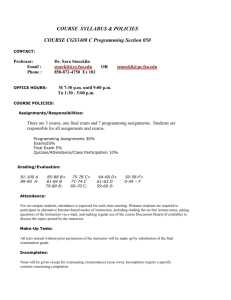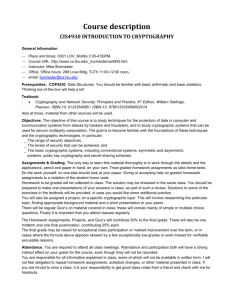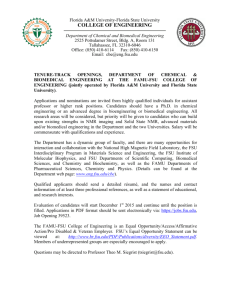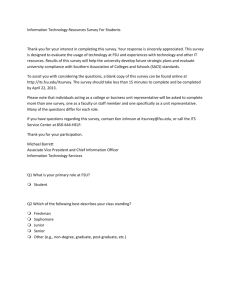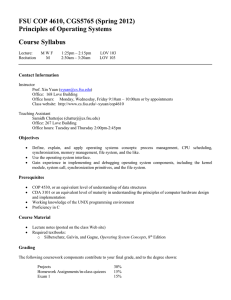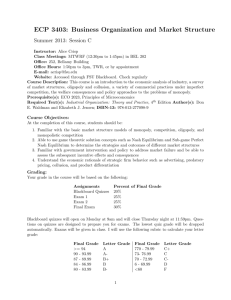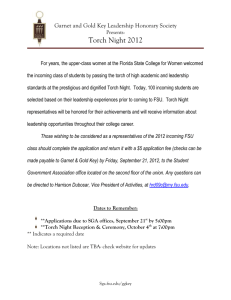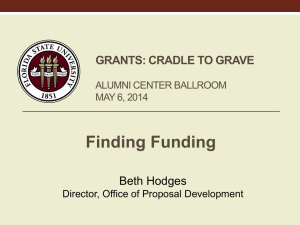Course Syllabus - FSU Computer Science Department
advertisement
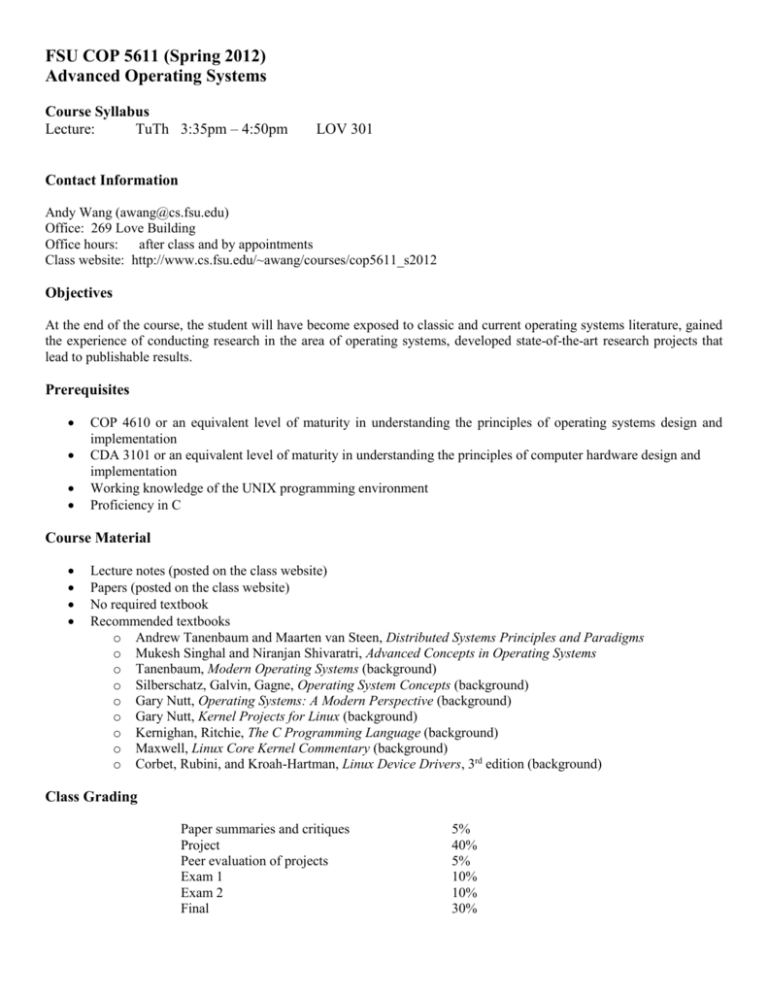
FSU COP 5611 (Spring 2012) Advanced Operating Systems Course Syllabus Lecture: TuTh 3:35pm – 4:50pm LOV 301 Contact Information Andy Wang (awang@cs.fsu.edu) Office: 269 Love Building Office hours: after class and by appointments Class website: http://www.cs.fsu.edu/~awang/courses/cop5611_s2012 Objectives At the end of the course, the student will have become exposed to classic and current operating systems literature, gained the experience of conducting research in the area of operating systems, developed state-of-the-art research projects that lead to publishable results. Prerequisites COP 4610 or an equivalent level of maturity in understanding the principles of operating systems design and implementation CDA 3101 or an equivalent level of maturity in understanding the principles of computer hardware design and implementation Working knowledge of the UNIX programming environment Proficiency in C Course Material Lecture notes (posted on the class website) Papers (posted on the class website) No required textbook Recommended textbooks o Andrew Tanenbaum and Maarten van Steen, Distributed Systems Principles and Paradigms o Mukesh Singhal and Niranjan Shivaratri, Advanced Concepts in Operating Systems o Tanenbaum, Modern Operating Systems (background) o Silberschatz, Galvin, Gagne, Operating System Concepts (background) o Gary Nutt, Operating Systems: A Modern Perspective (background) o Gary Nutt, Kernel Projects for Linux (background) o Kernighan, Ritchie, The C Programming Language (background) o Maxwell, Linux Core Kernel Commentary (background) o Corbet, Rubini, and Kroah-Hartman, Linux Device Drivers, 3rd edition (background) Class Grading Paper summaries and critiques Project Peer evaluation of projects Exam 1 Exam 2 Final 5% 40% 5% 10% 10% 30% Every week of the first ten weeks, you will turn in a one one-page critique in class and through Turnitin.com (via BlackBoard) on either the assigned papers or papers from specified venues. You will develop a project of your interest and caliber, in teams of two or three. For each week, each team is required to turn in a one-page project report to demonstrate steady progress. By the fifth week you will submit a two-page proposal of your term project and give a short presentation in class. During the last two weeks of the course you will turn in a final paper and present your final project. Also, you will submit critiques on two class projects that are not yours. We will hold in-class, closed-book examinations, unless specified otherwise. Examinations will likely be in the form of essays or short answers that involve applying the knowledge and concepts learned in class. Computer Accounts You will need a computer science account. If you don’t have one, use the following link to obtain one ( http://www.cs.fsu.edu/sysinfo/newstudent.html). You will also need an ACNS account (@garnet.fsu.edu) for receiving class emails and using the discussion board. If you want, you can forward your garnet email to other accounts (https://cars.acns.fsu.edu). Your Responsibilities Understand the lecture slides and assigned papers Uphold academic honesty in completing your assignments and exams Attend office hours for extra help Turn in your projects on time Check the class web page regularly Resources Class newsgroup: http://campus.fsu.edu Emacs reference card: http://www.cs.rutgers.edu/LCSR-Computing/some-docs/emacs-chart.html Course Calendar (Tentative) Week Date Lecture 1 1/5 Course overview 2 1/10 TrueErase: storage-data-path-wide per-file secure deletion 1/12 Advanced file systems issues 3 1/17 FFS, LFS, and RAID 1/19 File system extensibility, non-disk file systems 4 1/24 Caching for file systems; possible course projects 1/26 Threads, events, and scheduling, interprocess communications 5 1/31 Interprocess communications part II 2/2 Exam 1 6 2/7 Project proposal presentations 2/9 Operating systems organization 7 2/14 Operating systems organization part II 2/16 Distributed operating systems part I 8 2/21 Distributed operating systems part II 2/23 Distributed operating systems part III 9 2/28 IPC in distributed systems 3/1 Distributed file systems 10 3/6 Spring Break 3/8 Spring Break 11 3/13 Exam 2 3/15 Distributed file systems part II 12 13 14 15 16 3/20 3/22 3/27 3/29 4/3 4/5 4/10 4/12 4/17 4/19 The Google File System, OceanStore, ZFS Hadoop, Facebook Photo Storage Operating systems security Operating systems security part II Automated Worm Fingerprinting Operating systems reliability Recovery-oriented computing Project presentations Project presentations Course Policies University attendance policy: Excused absences include documented illness, deaths in the family and other documented crises, call to active military duty or jury duty, religious holy days, and official University activities. These absences will be accommodated in a way that does not arbitrarily penalize students who have a valid excuse. Consideration will also be given to students whose dependent children experience serious illness. Missed exams: A missed exam will be recorded as a grade of zero. We will follow the university rules regarding all missed exams (http://registrar.fsu.edu/dir_class/fall/exam_schedule.htm). Incomplete grade: An incomplete grade will be assigned only under the following exceptional circumstances: If you miss the final exam with an accepted excuse, you must make up the exam during the first two weeks of the following semester. Due to extraordinary circumstances, with appropriate documentation, the student can make up the missed portion of the course prior to the end of the next semester. Academic honor policy: The Florida State University Academic Honor Policy outlines the University’s expectations for the integrity of students’ academic work, the procedures for resolving alleged violations of those expectations, and the rights and responsibilities of students and faculty members throughout the process. Students are responsible for reading the Academic Honor Policy and for living up to their pledge to “. . . be honest and truthful and . . . [to] strive for personal and institutional integrity at Florida State University.” (Florida State University Academic Honor Policy, found at http://dof.fsu.edu/honorpolicy.htm.) ADA: Students with disabilities needing academic accommodation should: (1) register with and provide documentation to the Student Disability Resource Center; and (2) bring a letter to the instructor indicating the need for accommodation and what type. This should be done during the first week of class. This syllabus and other class materials are available in alternative format upon request. For more information about services available to FSU students with disabilities, contact the: Student Disability Resource Center 874 Traditions Way 108 Student Services Building Florida State University Tallahassee, FL 32306-4167 (850) 644-9566 (voice)
